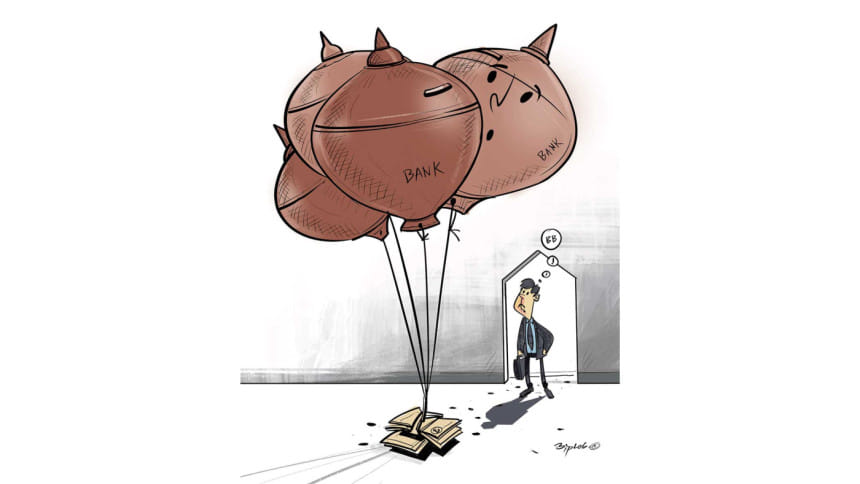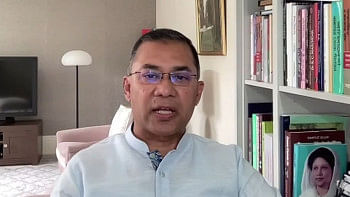Is Bangladesh Bank’s new decision good for the banking sector?

Over the years, experts have identified two major problems in Bangladesh's banking sector. The first is that we have too many banks, owned by a group of influential people. Many of these banks have repeatedly approved loans to subsidiary companies of other bank owners or people associated with them, who are among the major loan defaulters in our country. This is connected to the second problem, which is the massive growth of non-performing loans (NPLs) in the banking sector. Both are the results of the policies taken by our regulators, or have happened due to their inaction.
In a recent move, the Bangladesh Bank decided to permit banks not to treat borrowers as defaulters if they repaid only 15 percent (or more) of their total loan instalments payable—down from 25 percent in 2020. Additionally, banks were permitted to transfer the unrealised interest on the 85 percent (or less) of the loans to their income books—up from 75 percent the year before—even if the sums were not paid. Because of this relaxed policy, borrowers remained unclassified by paying only 15 percent of their loan amounts for the year. And banks were able to lower their provision requirement, which raised most banks' operating profits in 2021.
According to experts, the high operating profit logged by banks did not reflect the real figure, which is giving an unrealistic picture—a dangerous thing for banks. The most glaring problem here is that there is no way that banks will actually realise the whole amount they are still owed—some of which they have already included in their operating profits for 2021. That is simply not how the banking system works anywhere in the world. And banks in Bangladesh have an even poorer track record when it comes to recovering such funds—which got worse after the pandemic. Therefore, the banks' balance sheets have become increasingly more detached from reality.
Second, by inflating their incomes this way, banks are overstating their profits and are creating the scope for paying higher dividends to their owners and shareholders, without really making any extra earnings to pay their shareholders from. Even though the central bank has said it has directed banks to refrain from distributing dividends as an extra precaution, one wonders whether the central bank or the commercial banks will actually follow through with this, given their poor track record of abiding by their own set of rules.
Third, by recording higher profits and creating the scope for giving out more dividends, banks are pushing their stock prices up—again, not by operating more efficiently or being more productive, but simply by changing the numbers. Meanwhile, the regulators cheer them on, whereas it is their duty to prevent such accounting manipulation.
Finally, all these are going to distort market operations. In a free market, the market is supposed to fix the prices—i.e. determine what something is really worth. By permitting such accounting changes, the regulators are not allowing the market to operate, thereby destroying its ability to determine prices. Such market distortion is dangerous, especially in the financial sector.
Interestingly, the Bangladesh Bank issued the aforementioned directive a few hours after its meeting with some of the country's top business leaders at its headquarters, even though we are not aware of the central bank conducting any studies to estimate what effects its decision would have on the overall economy.
This, of course, is not the first time that intervention occurred in the banking sector at the behest of special interest groups: for example, when habitual defaulters were left untouched along with their banker cronies, and the state decided not to punish the wilful and habitual defaulters but to "bail out" the banks using taxpayers' money. This happened despite the fact that banks were clearly okay with, if not complicit in, the "corruption" that had destroyed their balance sheets. The state decided to shift the losses, caused by the wilful defaulters, "onto the public" by using taxpayers' money to bail the banks out. Such practices cannot lead to financial discipline and a robust banking sector.
These interventions are clearly not in the interest of the public, or the banks themselves in the long run. Even though the Bangladesh Bank is allowing banks to pretend like they are performing well, the reality is that they are becoming more vulnerable.
Now, according to the central bank, this move was necessary to ensure that businesses are able to recover from the pandemic-induced setbacks. And it is true that the government should pursue policies that are business-friendly in order to get the economy back on track. We are in favour of such policies. But the one that the Bangladesh Bank is following could allow wilful defaulters and cronies to flourish, and do little to help the genuine businessmen to operate within the law. In the long run, this can endanger our already weakened banking sector—weakened by the past policies of the regulators and their failure to stop one scam after another.
At the end of the day, what is important is that genuine businesses that make profit by providing something of value to the people get support from the government, not those who make profit by getting subsidies by lobbying to the authorities. In regards to the central bank's latest policy, how does it intend to ensure that is not the case—especially given what has happened in the banking sector over the past many years?
Around the world, governments are supporting businesses in their countries to recover from losses incurred during the pandemic. But at the same time, almost all central banks around the world are trying to get commercial banks in their countries to increase provisions in order to offset the risks brought about by the pandemic. We seem to be doing the very opposite.
Even though the Bangladesh Bank has asked banks to maintain an additional three percent (on top of the existing one percent) provisions, relaxing banking discipline and allowing habitual defaulters to potentially get more access to bank credits is dangerous, and may lead to further expansion of NPLs, which is already very high.
Again, one must ask, on what basis did the Bangladesh Bank make this decision? Was it based on any case study? The central bank owes the public an answer to this question.
Eresh Omar Jamal is a member of the editorial team at The Daily Star. His Twitter handle is: @EreshOmarJamal

 For all latest news, follow The Daily Star's Google News channel.
For all latest news, follow The Daily Star's Google News channel. 



Comments